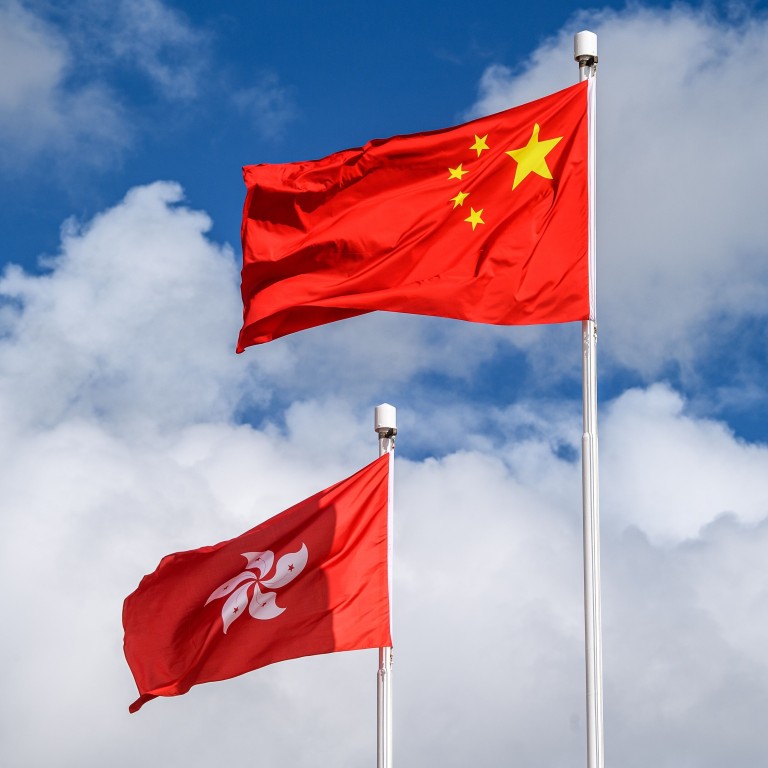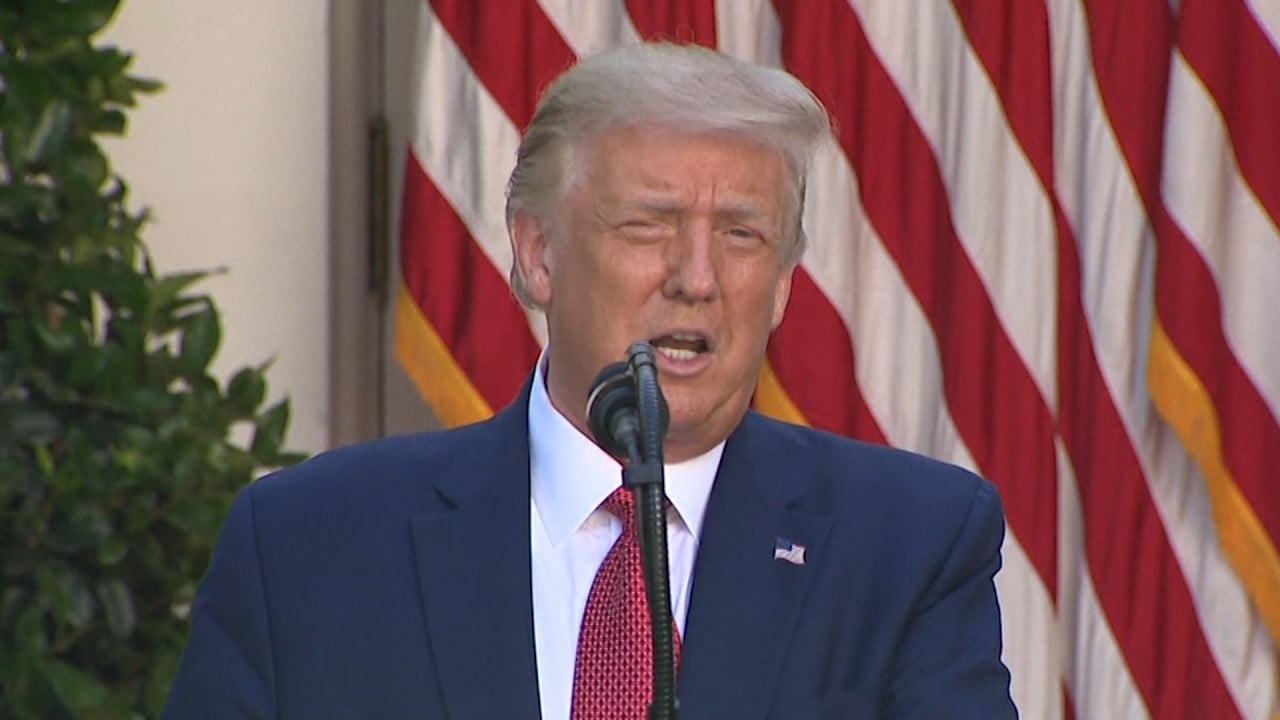
National security law: Beijing vows to retaliate after Donald Trump ends special treatment for Hong Kong and targets officials with sanctions
- US president signs act aimed at punishing Chinese and city officials deemed to undermine established freedoms in wake of national security law
- Hong Kong government says measures will cause ‘very serious damage to American companies and citizens’
Beijing vowed to retaliate with tit-for-tat sanctions while Hong Kong was left counting the cost on Wednesday after US President Donald Trump signed an executive order ending the city’s preferential trading status and a law to penalise mainland Chinese and local officials deemed to have trampled on Hongkongers’ rights.
“Hong Kong will now be treated the same as mainland China. No special privileges, no special economic treatment, and no export of sensitive technologies,” Trump said.
Trump’s executive order will also put an end to preferential treatment for Hong Kong SAR passport holders over those with mainland Chinese passports entering the US, as well as suspend an agreement between the city and Washington over the surrender of fugitive offenders.

02:09
Trump signs Hong Kong Autonomy Act, ends city’s preferential trade status over national security law
The Hong Kong government issued a statement on Wednesday night saying it would cooperate with Beijing’s countermeasures against the US.
“We will not let US hegemony get its way,” it said. “The US side unveiled these measures in defiance of international law on the pretext of human rights, democracy and autonomy.
“What makes people angrier is that the US side uses the slogan of ‘support Hong Kong people’ to justify its bad behaviour. Its acts are hypocritical and will certainly cause very serious damage to American companies and citizens.”
In his executive order, Trump said the imposition of the national security law and other moves by Beijing “to fundamentally undermine Hong Kong’s autonomy, constitutes an unusual and extraordinary threat to the national security, foreign policy, and economy of the United States”.
It will definitely bite and goes further than what was anticipated some time ago
“I hereby declare a national emergency with respect to that threat,” he said.
Washington has decided to treat Hong Kong as just another Chinese city after the passage of the national security law on June 30, banning acts of secession, subversion, terrorism and collusion with foreign forces to endanger national security.
Youth activist Joshua Wong Chi-fung, who along with other opposition politicians lobbied Washington and Western governments to punish Beijing through Hong Kong, said the law signed by Trump offered the US administration new tools to pressure mainland China into relaxing its tightening grip over the city.
The Hong Kong General Chamber of Commerce warned that the city’s position as a global trade hub would be hurt in the middle of a recession exacerbated by the pandemic.
Hong Kong national security law official English version:
“We are disappointed with such retaliatory actions, which can only exacerbate the economic hardship of the Hong Kong people, rather than help them,” the city’s largest business group said.
“It will definitely bite and goes further than what was anticipated some time ago,” said a top diplomat based in Hong Kong. “But in the end, the big question remains whether the US will do anything to undermine Hong Kong as the international financial gateway to China by restricting its access to the US dollar trade. That does not seem to be the case at this stage.”
On a significant note, Washington did not target the 37-year-old Hong Kong dollar peg to the US dollar, or restrict access to the US currency payment system, which would have served as a nuclear option with possibly far greater impact.
Trump’s executive order: what is it and who will be affected?
However, the US secretary of state can ban certain individuals or entities from investing in or transferring any properties in the country. This includes Hong Kong government officials or leaders involved directly or indirectly in developing and enforcing the national security law.
The sanctions list includes those deemed to undermine democratic development in the city, and censor or penalise freedom of expression.

03:03
Hong Kong publishers resort to self-censorship under new security law
Trump’s executive order also puts an end to US training for Hong Kong police and other security agencies in the city, and revokes licence exceptions for exports to Hong Kong.
China’s foreign ministry reacted hours ahead of the Hong Kong government, condemning Trump’s move as a violation of international relations norms, and serious interference in the country’s internal affairs.
“The Chinese government resolutely opposes it and condemns it,” it said in a statement. “To protect its legitimate interests, China will take necessary action to impose sanctions against related US institutions and individuals.”
The statement did not spell out details, but added that China’s action would be “determined” and US attempts to oppose Hong Kong’s national security law would be futile.
“China’s sanctions will follow the pattern of its countermeasures of sanctioning a US entity and four US individuals over the Xinjiang-related issue. It would be reciprocal in number with the US action,” said Chen Long, a partner with independent research agency Plenum.

US senators Chris Van Hollen and Patrick Toomey, who introduced the Hong Kong Autonomy Act, were likely to be on China’s retaliation list, Chen said, while Senator Josh Hawley and some congressmen could also be targeted.
The end of preferential treatment means Hong Kong will no longer be immune to the tariffs Washington has slapped on Chinese exports over the course of the trade war that has raged for the past two years. Licence exemptions for exports and re-exports to the city and transfer within the mainland are revoked, while exports of defence items are banned.
As one of Hong Kong’s top trading partners, the US enjoyed an annual trade surplus of at least US$30 billion with the city for the decade to 2018.
Hong Kong’s domestic exports to the US last year amounted to HK$3.7 billion (US$477 million), or less than 2 per cent of local manufacturing output and less than 0.1 per cent of the city’s total exports
Hong Kong national security law full text
Lau Siu-kai, vice-president of the Chinese Association of Hong Kong and Macau Studies, a semi-official think, said Washington faced difficulty in coming up with effective punitive measures while minimising the impact on its own economic interests in Hong Kong.
“Washington doesn’t have many feasible options. Sanctioning Hong Kong officials is already the most drastic measure,” he said, “It stops short of targeting the Hong Kong dollar peg system or restricting access to the US dollar payment system.”
Felix Chung Kwok-pan, leader of pro-business Liberal Party, said the news about US sanctions had been expected and largely digested already. “But it is inevitable that there could be some psychological effect on the international community,” he said.
Chung suggested it was too early to assess how much Hong Kong would be hurt, pending more details of the US sanctions.

Christopher Cheung Wah-fung, the lawmaker representing the financial services sector, noted that investors had mostly shrugged off the bad news and the city’s benchmark Hang Seng Index closed nearly flat on Wednesday. “Investors will go where there is money to make,” he said.
Former security minister and veteran pro-establishment lawmaker Regina Ip Lau Suk-yee, also a top adviser to the local government, said: “The most ridiculous move is to sanction Hong Kong officials and even arrest those who implement the new law. That will create a chilling effect on officials.”
One of her colleagues in the Executive Council, business leader Jeffrey Lam Kin-fung, said he himself did not have any properties or investments in the US, and the impact of freezing Hong Kong officials’ assets would be very limited.
Hugh Chow, CEO of the largest local research and development centre, the Hong Kong Applied Science and Technology Research Institute, said the city would remain a link between East and West for talent and capital in innovation and technology development despite Washington’s move.
“We will continue to be the bridge,” he said.
Additional reporting by Owen Churchill, Ng Kang-chung, Natalie Wong and Denise Tsang


